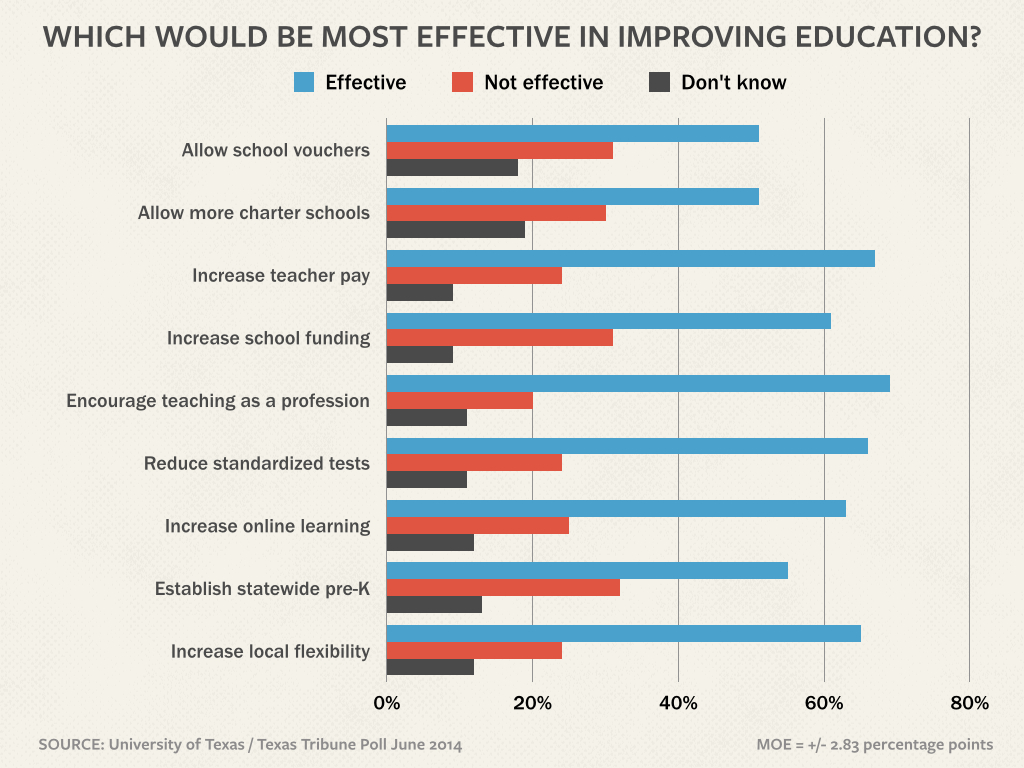UT/TT Poll: Fewer Voters See College as a Necessity
/https://static.texastribune.org/media/images/2014/06/16/UT-TT-Polls-06112014.001.jpg)
Texas voters are supportive of some potentially major changes in public education, from providing incentives to people who want to be teachers to allowing more local control over standards and curriculum, according to the University of Texas/Texas Tribune Poll.
Meanwhile, fewer of them are convinced that a college degree is a necessity. Only 28 percent said a college education is necessary for a person to succeed in today’s work world, while 68 percent said “there are many ways to succeed ... without a college degree.” That’s a big change from the UT/TT Poll of May 2010, when 42 percent called college necessary and 56 percent said there are other paths to success.
“Universities have to be careful about their pricing structure, about their return on investment,” said Daron Shaw, co-director of the poll and a professor of government at UT-Austin. He mentioned successful people who didn’t get college degrees to illustrate the point. “The leverage that colleges have over young people is limited,” Shaw said. “You can be Bill Gates or Steve Jobs.”
Jim Henson, co-director of the poll and head of the Texas Politics Project at UT-Austin, said the movement in the numbers from 2010 to now is significant.
“When I look at the top line on that, what I see, at first cut, is the impact of four years of people talking about increasing tuition rates and increasing student debt and a difficult economy that has seemingly reduced the benefit of a college degree,” he said. “The skepticism is much stronger among Republicans and conservatives than among Democrats and liberals.”
Voters are open to an array of proposed education reforms, including school voucher programs, more charter schools, higher pay for teachers, increased funding for public education, encouraging new teachers to enter the profession, cutting standardized tests, more online learning, statewide pre-kindergarten and greater local control over schools.
But not all reforms are created equal. While 69 percent said incentives to choose teaching as a career would be “extremely” or “somewhat” effective, only 51 percent gave those marks to voucher and expanded charter programs. Higher pay for teachers was attractive to 67 percent, and reducing the number of standardized tests was judged effective by 66 percent.
At least 30 percent of the poll respondents judged four ideas to be either “not very” or “not at all” effective: statewide pre-K, school vouchers, increased school funding and expanding the number of charter schools.
Asked to choose a single reform from the list that would be most effective, 20 percent chose increased funding for education, while three selections each got 14 percent support: creating a school voucher program, reducing tests and allowing more local control.
The selections have a partisan tang to them. Voters who identify themselves as Republicans chose increased funding, more local control and vouchers as their top three choices. For Democrats, the top three were increased funding, reduced testing and statewide pre-K. And those who identify themselves as Tea Party voters chose vouchers, local control and more charter schools.
“What you end up with is a representation of the supposedly conservative viewpoint of charters and vouchers against the Democratic variations on spending,” Shaw said. “A majority for vouchers really stands out, and a seventh of the electorate thinks that would be the most effective reform.”
The University of Texas/Texas Tribune internet survey of 1,200 registered voters was conducted May 30 to June 8 and has an overall margin of error of +/- 2.83 percentage points. For this survey, we have shortened the time between polling and reporting the results to get a more timely measurement of sometimes rapidly changing public opinion. For questions of likely Republican primary voters, the margin of error is +/- 4.37 percentage points; for likely Democratic primary voters, +/- 4.75 percentage points. Numbers in the charts might not add up to 100 percent, because of rounding.
This is one of several stories on the latest University of Texas/Texas Tribune Poll. Thursday: The statewide general election races and a peek at the 2016 presidential primaries. Friday: Texans’ views on various officeholders and candidates, on the state of the state and the country, and on the Tea Party. Yesterday: Which major party candidates for governor would do a better job on big issues, and most important problems facing the state and the country. Tomorrow: Voters’ views on immigration and the Affordable Care Act. Texas voters on a range of social issues.
Information about the authors
Learn about The Texas Tribune’s policies, including our partnership with The Trust Project to increase transparency in news.


/https://static.texastribune.org/media/profiles/ramsey-ross_TT.jpg)